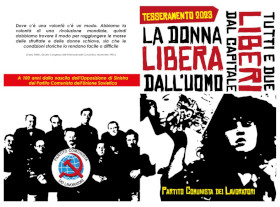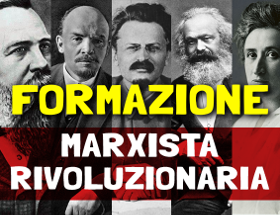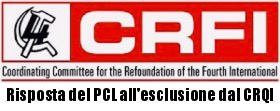Internazionale
For the expropriation of the war industry, under workers' control
For an antimilitarist response that goes beyond pacifism
3 Settembre 2025
'War is a gigantic commercial enterprise, especially for the war industry. The “60 Families” are therefore first-line patriots and the chief provocateurs of war. Workers’ control of war industries is the first step in the struggle against the “manufacturers” of war.
To the slogan of the reformists: a tax on military profit, we counterpose the slogans: confiscation of military profit and expropriation of the traffickers in war industries. Where military industry is “nationalized,” as in France, the slogan of workers’ control preserves its full strength. The proletariat has as little confidence in the government of the bourgeoisie as in an individual capitalist.
Not one man and not one penny for the bourgeois government!
Not an armaments program but a program of useful public works!'
(Trotsky, 1938, Transitional Program)
The arms race spans all imperialist countries. The war in Ukraine has certainly accelerated this race. But the race has a global reach far beyond Ukraine.
Russian imperialism now relies on a fully-fledged war economy, investing 6% of its GDP in its military. Chinese imperialism is developing its military capabilities to unprecedented levels on land, air, and sea; its defense budget now exceeds $500 billion annually, and its navy has now surpassed that of the competing American fleet.
US imperialism under the second Trump administration (which some would call “pacifist”) is promoting massive new investment in armaments: along with tax cuts for capitalists, increased military spending is the primary investment area for the money saved from social cuts in Trump’s current budget. If the Pentagon, unlike the State Department, has repeatedly held back aid to Ukraine, it’s because American generals want to replenish their arsenals, not deplete them (for example, the US has 3,376 Patriot missiles and wants to raise this number to 13,773).
The European imperialisms have just agreed in NATO to double or triple their investments in weapons (up to 5% of GDP), already facilitated by the security clauses provided for by the new Stability Pact (the possibility of increasing their defense spending budget by 1.5%).
Trump’s pressure, but above all the threat of US withdrawal from Europe, has pushed all the imperialist governments of the Old Continent beyond their old spending limits. All of them. The “left-wing” government of Spanish imperialism, which the European left-wing parties extol as an example, has avoided using its NATO veto, has signed the agreement on a 5% increase in military spending like the others, and has already included the increase in military spending in its own budget, despite its “pacifist” posturing on camera.
The truth is that all European imperialisms, without exception, are pursuing a militarist course. In an international capitalist framework where military power has always been a yardstick for imperialist ambitions, European governments cannot do otherwise. Only by rebuilding their own military power can they hope for a place at the table in the future division of the world, without being crushed, as they are today, in the grip of the USA, China, and Russia.
At the same time, the union of European imperialisms is more than ever crossed by strong national rivalries, even on the military level.
Germany has implemented a rearmament plan unprecedented in the postwar period, and unparalleled in Europe, thanks to a financial leeway unrivaled by any other European country. The claim to German military primacy in Europe is already on the table of the continental balance of power. Germany’s projection into Northern Europe, as a potential protective shield—in the face of the threat of Trumpian withdrawal—rests on this foundation.
France is responding to German competition by doubling its military budget for the 2017-2027 decade and by entering into a pact with Great Britain based on shared nuclear weapons and a joint presence on the UN Security Council. The Franco-British offer of a protective nuclear umbrella over Europe, controlled by London and Paris, is a response to Berlin’s ambitions. In this way, Great Britain is entering into the EU’s internal contradictions, bringing its extensive military experience as a dowry.
Italian imperialism is fully involved in this great game. It has supported US imperialism and its policies in the Middle East and Africa to capitalize on the disintegration of the French colonial empire in the Sahel, and has demanded in exchange US recognition of Italy’s primacy in the Mediterranean. The arrival of Donald Trump has complicated the operation, but has not eliminated it. The significant increase in Italy’s military spending, starting with the announced €4 billion increase in the next budget law, is an essential component. So is the game of collusion with German imperialism, which is openly anti-French.
The Italian arms industry is the primary beneficiary of this general context. Leonardo, Fincantieri, OTO Melara, Iveco—the major arms capitalists—see their stocks soar on the stock market and their businesses expand: in the construction of the world’s most powerful fighter jet in a consortium with Great Britain and Japan, in the manufacturing of new tanks in synergy with Germany, in the construction of the Gulf States’ military fleet, in global military shipbuilding. The USA included: the Italian Foreign Minister recently showed US Secretary of State Marco Rubio the cream of the crop of Fincantieri’s plants in Wisconsin and Florida, and Leonardo’s factories in Virginia, Ohio, North Carolina, California, New York, Alabama, and Arizona, as proof and measure of Italy’s contribution to the American military, and therefore a (hoped-for) reason for attention and consideration toward Italy, perhaps on tariffs.
But that’s not all. Plans are advancing in Italy for the potential repurposing of parts of the automotive and component industries for wartime purposes, in perfect parallel with similar projects in Germany and France. The leap in military investment, forced by the new global climate, is being used as an antidote to economic stagnation and recessionary pressures. A new tonic for Italian capitalism. Naturally, as everywhere else in the world, at the expense of its own workers.
In this general picture, the utter impotence of pacifist illusions emerges ever more clearly. Even when they are sincere. Even when they are not the rhetorical cover for some new imperialist power and its “peace solutions.”
From a historical perspective, the course of world politics is headed toward war. Imperialist wars, from the Russian invasion of Ukraine to the US bombing of Iran, mark like a seismograph the earth tremors sweeping across the planet. The Zionist state’s criminal and warmongering policies, beyond their specificities, are perfectly aligned with the power politics sweeping the world, and it is no coincidence that they enjoy the support or complicity of all imperialist powers, old and new, without exception.
The idea that any right to national self-determination of oppressed peoples can be entrusted to phantom “peace conferences” convened by the UN and blessed by the Pope merely reflects the legacy of old, deceitful illusions about imperialist diplomacy, precisely at a time when those illusions are being daily shattered and humiliated by the new framework of world relations. The idea that a pacifist recommendation to one’s imperialist government can halt the militarist course is no less far-fetched. Only the revolutionary overthrow of capitalism and imperialism can usher in a future of true and just peace for humanity and for every oppressed people.
Precisely for this reason, in imperialist countries, starting with our own imperialism, it is important to equip ourselves with slogans and demands that build a bridge between the sincere demand for antimilitarist peace, the refusal to pay for war costs with social cuts, and the necessary anticapitalist perspective.
The demand for the expropriation of the war industry without compensation and under workers’ control can and must be part of every mobilization against war and the war economy, alongside the defense of the right to resistance of every oppressed people.
The demand for the expropriation of the war industry belongs to the finest tradition of the revolutionary workers’ movement, and is extraordinarily timely today. It focuses on the internal front, against the core of current dominant policies. The conversion of industry to war production must be countered by the conversion of part of the war industry to civilian production. And no conversion of the war industry while respecting workers’ rights can take place without expropriating its shareholders —the “war manufacturers”— and without workers’ control. For all these reasons, the demand for the expropriation of the war industry calls into question the bourgeois order of society. Therefore, it raises the need for a workers’ government as the only viable alternative.
To those who defend “our” war industry, and above all its property, in the name of defending the homeland (be it national or EU) – perhaps even evoking the winds of war blowing in the world – we respond with Trotsky’s words:
'“Defense of the Fatherland?” – But by this abstraction, the bourgeoisie understands the defense of its profits and plunder. We stand ready to defend the fatherland from foreign capitalists, if we first bind our own (capitalists) hand and foot and hinder them from attacking foreign fatherlands; if the workers and the farmers of our country become its real masters, if the wealth of the country be transferred from the hands of a tiny minority to the hands of the people; if the army becomes a weapon of the exploited instead of the exploiters.
It is necessary to interpret these fundamental ideas by breaking them up into more concrete and partial ones, dependent upon the course of events and the orientation of thought of the masses. In addition, it is necessary to differentiate strictly between the pacifism of the diplomat, professor, journalist, and the pacifism of the carpenter, agricultural worker, and the charwoman. In one case, pacifism is a screen for imperialism; in the other, it is the confused expression of distrust in imperialism. When the small farmer or worker speaks about the defense of the fatherland, he means defense of his home, his family and other similar families from invasion, bombs and poison gas. The capitalist and his journalist understand by the defense of the fatherland the seizure of colonies and markets, the predatory increase of the “national” share of world income. Bourgeois pacifism and patriotism are shot through with deceit. In the pacifism and even patriotism of the oppressed, there are elements which reflect on the one hand a hatred of destructive war, and on the other a clinging to what they believe to be their own good – elements which we must know how to seize upon in order to draw the requisite conclusions.'
(Trotsky, 1938, Transitional Program)
Exactly. A large part of the left often, paradoxically, does the opposite: it adapts to bourgeois pacifism (of its own imperialism or that of others) and refuses to translate workers’ and popular pacifism into revolutionary terms.
Demanding the expropriation of the war industry is a way of translating and updating the lesson of the former leader of the Red Army, within the more general framework of revolutionary politics.










